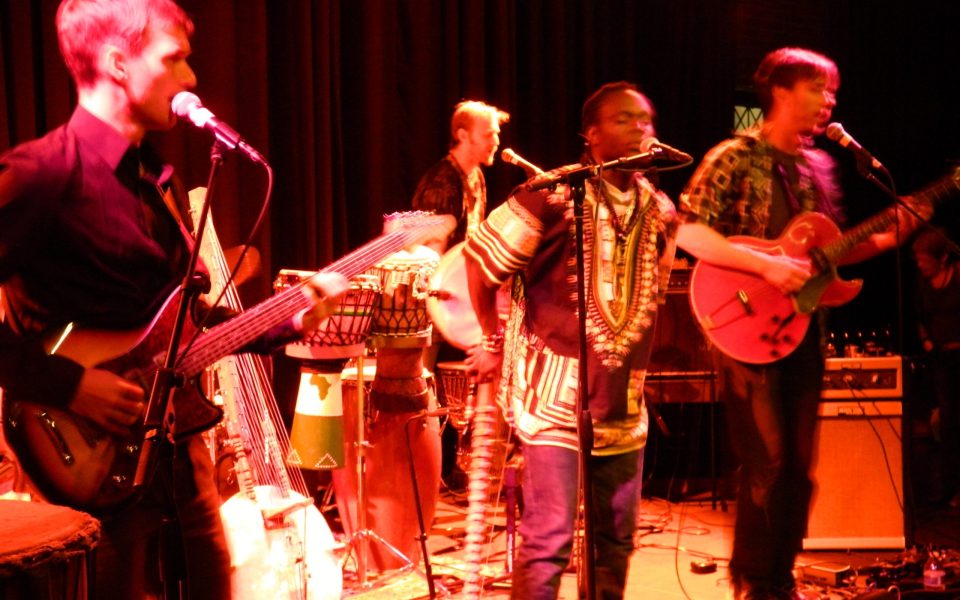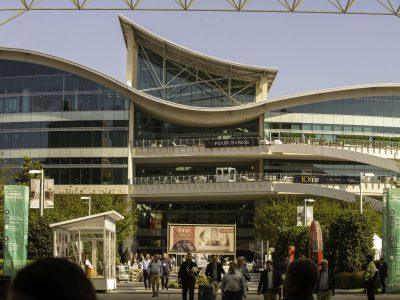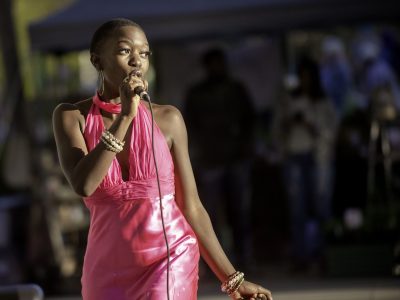by Jordan Green
Diali Cissokho & Kaira Ba brought its explosive brand of kora-based dance music to the Crown in Greensboro on May 16, entwining with two opening groups that shaped the various members’ musical destinies.
Greensboro folksinger Bruce Piephoff opened the show, accompanied by longtime collaborator Scott Sawyer on electric guitar. Sawyer plays a fluid, dexterous jazz style with tendrils reaching towards country and rockabilly — essentially a mash-up of Americana covering the 1947-54 period — that provides a nice complement to Piephoff’s rambling folk sensibility.
Sawyer’s protégé, John Westmoreland, plays guitar in Kaira Ba, the backing band of Senegalese griot Diali Cissokho.
And marking a segue between the folk-Americana of Piephoff-Sawyer and the shamanistic, transatlantic party thrown by the headlining act, Will Ridenour and Jonathan Henderson of Kaira Ba rejoined Cakalak Thunder, a radical drum corps that recently celebrated its 10th anniversary, for a customarily righteous and loud performance embodying an uncompromising stance of liberation and opposing all oppression.
A Greensboro native, Ridenour traces his musical roots to the hardcore band Zegota, but has been traveling to West Africa to study the kora, a 22-stringed harp-like instrument, since the late 1990s. Throughout much of the 2000s, Ridenour and Jonathan Henderson — a one-time housemate — participated in a wide and sometimes overlapping array of musical and activist projects that were bubbling out of the Gate City’s fertile anarchist scene, including Cakalak Thunder, Invisible and Dawn Chorus.
At the end of the last decade, Ridenour and Henderson succumbed to the creative pull of the Triangle, and found themselves discussing various ideas for a politically inspired dance band.
It didn’t take long for serendipity to strike.
Diali Cissokho, a Senegalese kora player from a family of griots — storytellers, singers and dancers — immigrated to Pittsboro with his new wife in 2010. He wasted no time pursuing his dream.
“Diali had a vision that he was going to find his band when he moved here, and it happened quickly,” Henderson recalled. “His wife connected him with us. She studied kora under him and they fell in love. And that’s how he ended up in central North Carolina.”
Cissokho’s agenda is specific and uncomplicated.
“This kind of band is about life and bringing people together in peace and giving people right medicine,” Cissokho said while waiting for Westmoreland and drummer Austin McCall to pick up the band’s takeout order from Grey’s Tavern before their gig at the Crown.
With Ridenour on percussion, McCall on trap-set drums and Henderson on bass, Kaira Ba channels the explosive energy of Cakalak Thunder, performing with both precision and inspiration. Cissokho, ever the consummate bandleader and charismatic front man, directs stops and starts with a series of well-placed nods. Ridenour and McCall’s percussive partnership lays a foundation for an exhilarating interplay between Cissokho’s kora and Westmoreland’s electric-guitar playing. Cissokho’s voice, a plaintive and powerful instrument, rises above the exquisite latticework of rhythm and melody as a joyous offering.
The band has a rich repertoire of original songs from which to draw for life performances from their debut album, Resonance, to their recent release, The Great Peace. Both albums feature a bracing fusion of West African traditional music, funk, blues and jazz and songs that variously pay tribute to Cissokho’s family members, reference Senegalese history and highlight themes of unity and universal love.
“The first CD was we learning and being close friends because that’s the time we started,” Cissokho said. “The second CD is, we’re ready.”
Cissokho played three koras of different sizes during the May 16 concert at the Crown, often from the standard position with the instrument jutting diagonally from his waist, but other times behind his back or with his teeth. While singing and directing the band, he played the kora as if by second nature, drawing out cascades of notes that ranged from trilling to insistently accented. His playing joined with that of guitarist Westmoreland in a call and response, with the guitar player often coaxing similar sounds with equal speed and dexterity from his instrument.
The co-equal primacy of percussion and strings in the music was underscored when at times Cissokho, Westmoreland and Henderson put down their primary instruments and picked up drums in seamless transition as their voices held the melodic line of whatever song they were playing.
McCall played standard rock drums with raw, get-your-yas-yas-out power at the right moments, while Ridenour’s playing on djembe and congas came across more delicately, sometimes like seagulls fluttering over the waves of the ensemble’s churning heave. As an accomplished kora player himself, he understands the instrument well enough to add melodic ideas underneath Cissokho’s playing through percussion.
The band’s versatility was on display when Sawyer joined them for one song, contributing psychedelic-blues texture to the West African dance rhythms. Westmoreland’s gratitude to his teacher and Sawyer’s delight in exploring new sonic territory were evident in their mutual smiles.
Cissokho’s intrepid spirit as an immigrant musical visionary and his band’s eager partnership came across most clearly during the band’s finale of “Mbolo,” the lead track from the new album. The lyrics of many of Cissokho’s songs are sung in his native Mandinka, but on “Mbolo” he sang a heartfelt message in heavily accented English: “People of Europe, people of Africa, people of America, let’s get together/ We don’t need no more fight, no matter where you are, no matter who you are, no matter where you from.”
The band responded with the chorus in Mandinka: “Mbolo moy sunu dole,” which translates as, “There is great power in our common strength.”
With Cissokho flanked by Ridenour and Westmoreland, the bandleader draped his arms around the two musicians and entreated members of the audience to hug one another.
“That’s what we need,” he said. “Love and happiness.”
Join the First Amendment Society, a membership that goes directly to funding TCB‘s newsroom.
We believe that reporting can save the world.
The TCB First Amendment Society recognizes the vital role of a free, unfettered press with a bundling of local experiences designed to build community, and unique engagements with our newsroom that will help you understand, and shape, local journalism’s critical role in uplifting the people in our cities.
All revenue goes directly into the newsroom as reporters’ salaries and freelance commissions.





Leave a Reply